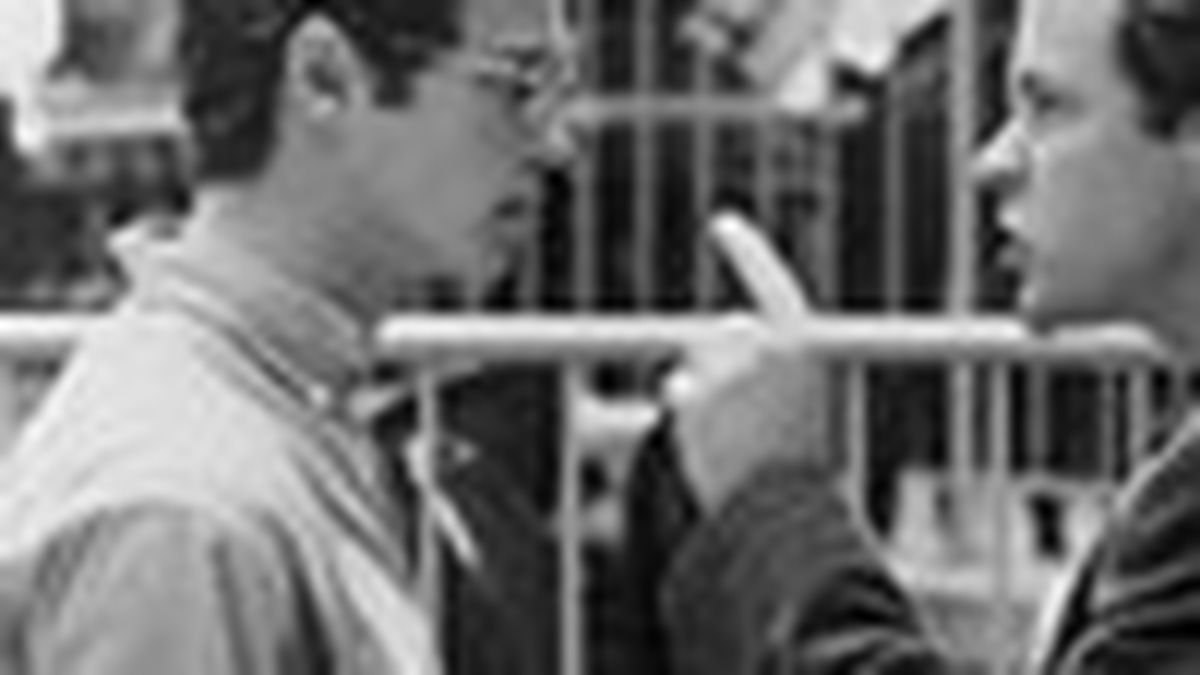In the annals of fraud and fakery, a discredited ex-magazine reporter named Stephen Glass will likely wind up a mere footnote. The people who forge Van Goghs and the con artists who bilk naive grandmothers out of their life savings (not to mention certain fast-dancing corporate executives) even more richly deserve the loathing that’s heaped upon them. Glass, who in the late 1990s fabricated parts or all of 27 of the 41 pieces he wrote for The New Republic, has even been upstaged recently by another former member of his former profession. Because the stately New York Times (“All the News That’s Fit to Print”) carries a lot more weight in the public eye than a small-circulation political journal like TNR, the Jayson Blair fake-stories scandal that badly shook the Times was itself a much bigger story than the Glass affair. In time, it, too, is bound to spawn a movie or three.
For now, we have Shattered Glass, first-time director Billy Ray’s scrupulously accurate, sometimes tedious account of Stephen Glass’s malfeasance, complete with lots of dark cautions and all the hand-wringing appropriate to the subject. Citizens already skeptical about, or contemptuous of, American journalism will find in it more grist for the mill. Here’s another brazen young liar exposed, and with him the corruptions of an institution in steep decline thanks to the Janet Cookes, Mike Barnicles, and Jayson Blairs of the world. For the rest of us, including those who report and write for a living, it’s a deeply unsettling tale of misdirected ego and stark betrayal that sets back all of us in terms of public trust. Ray says he doesn’t mean to bring more trouble down on Glass with the movie, but this punk could probably use a good kick in the ass.
As portrayed by a geeky, bespectacled Hayden Christensen (Anakin Skywalker in Star Wars: Episode II), the fabricator is a self-aggrandizing 24-year-old who liked to stand up at staff meetings and crow about his supposed scoops, then turn out reams of low-grade fiction about political chicanery in Washington hotel rooms and teenage computer hackers who extort bundles of money from major software manufacturers. With his dangerous mixture of need, ambition, and infantilism, this unformed fantasist could not but go wrong. The wonder is how he got hired in the first place (the film doesn’t bother to say), and why it took so long for the editors he scammed to find him out. The possible answers to the second question are bothersome indeed. It’s likely that because the stories Glass fabricated seemed to suit The New Republic‘s liberal bent, neither the editor who was his mentor, Michael Kelly (Hank Azaria), nor the one who replaced him, Chuck Lane (Peter Sarsgaard), gave Glass’ work the kind of tough scrutiny it needed. His “reporting,” though bogus, regularly confirmed his bosses’ own doctrinal beliefs. There was also a crisis in office politics. When Kelly, a figure beloved to the young TNR staff, was fired, probably for his increasingly harsh views of the Clinton administration, Lane’s appointment was greeted with distrust and hostility. When his suspicions about Glass’ veracity began to grow, other staff writers (including those played here by Chloë Sevigny and Melanie Lynskey) saw that simply as Lane’s revenge against a Kelly loyalist.
In the end, though, the truth did out. Under his editor’s pressure to produce documentation of his sources, the desperate little hustler went so far as to scribble counterfeit story notes, print fake business cards, create a false Web site, and recruit his own brother to play a leading character from one of his journalistic fictions. Meanwhile, he wheedled and whined before the upright Lane (“Are you mad at me?” he asks, sounding exactly like a fourth-grader caught with his hand in the cookie jar). It was not TNR‘s editors who brought the most initial heat — that fell to suspicious reporters at the now-defunct online mag Forbes Digital Tool — and an appalled reporter named Buzz Bissinger later recounted the whole ugly tale in a Vanity Fair magazine article. But the hero of Ray’s adaptation turns out to be Lane, who fired Glass in 1998 and spent long months trying to repair the integrity of a respected magazine that’s been publishing since 1914. “Stop pitching, Steve,” the fed-up editor finally says. “It’s over.”
As it turns out, though, Steve can’t seem to stop pitching, even though he’s now almost thirty and should know better. After appearing on 60 Minutes, he earned a law degree from Georgetown University and, in a fetching stroke of irony that says everything about the depths of American celebrity culture, promptly wrote a novel. It is called The Fabulist, and it purports to tell all about a misguided young journalist who starts making up stories for an old-line political journal and finally has to pay the price. Book burnings are odious and antidemocratic, but in this case it might be lovely to see a tall stack of Glass’ first editions go up in flames.














